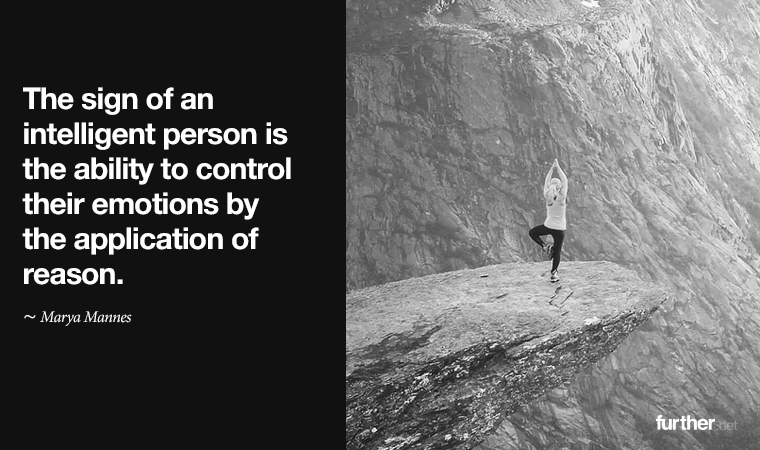
Viktor Frankl, the psychiatrist who survived a Nazi death camp, wrote the following in his memoir Man’s Search for Meaning:
- Between stimulus and response there is a space. In that space is our power to choose our response. In our response lies our growth and our freedom.
Last week we talked about the power of indifference toward things we can’t control. What we can control is our perception of the stimulus and resulting actions, and the key to that control is the space between an emotional trigger and our response.
Using that space to modify our response to emotional stimulus is the essence of Emotional Agility by Harvard psychologist Susan David, a book recommended to me by a Further reader (thanks Crystal!). It’s a methodology for breaking out of the vicious cycle of allowing triggering emotions to dictate our behavior.
- By opening up that space between how you feel and what you do about those feelings, emotional agility has been shown to help people with any number of troubles: negative self-image, heartbreak, pain, anxiety, depression, procrastination, tough transitions, etc.
It’s not just for managing negativity, though:
- Emotionally agile people are dynamic. They demonstrate flexibility in dealing with our fast-changing, complex world. They are able to tolerate high levels of stress and to endure setbacks, while remaining engaged, open, and receptive.
Emotional Agility is a solid book that offers up a process for breaking emotional rigidity by becoming “unhooked” from trigger emotions. Many of you will recognize the similarity of David’s advice to cognitive-behavioral therapy (CBT) techniques.
I first heard about the “space” that Frankl references in the context of meditation. Not only does the practice make you aware of your emotions and the self-talk that comes with them, it helps you focus on the space and expand it for use in daily life.
It’s as if time slows down to allow you more room to choose how to rationally respond, instead of reacting on emotional auto-pilot. This is the main reason I’ve re-committed to daily meditation, even if it’s only five minutes.
So, if you’re trying to change the way you react to life’s situations, that’s one more powerful and practical benefit of meditation. If you’re looking for a pragmatic approach to the practice, 10% Happier by Dan Harris remains the best book for the skeptical.
- Emotional Agility: Get Unstuck, Embrace Change, and Thrive in Work and Life
- 10% Happier: How I Tamed the Voice in My Head, Reduced Stress Without Losing My Edge, and Found Self-Help That Actually Works (Amazon Associate links)
Keep going-
Brian Clark
Further
further: health
New Year’s Repetitions
Going to the gym was once a simple affair – tapping the desired pace in the treadmill and approaching your run as though it was just another chore to tick off. But the desire for fitness that’s fun has changed all of that.
Crawling, Slacklining and … Sleeping? The Fitness Trends We’ll All be Doing in 2017
Diet Choke
A team of Massachusetts General Hospital (MGH) investigators has found a possible mechanism explaining why use of the sugar substitute aspartame might not promote weight loss.
Aspartame May Prevent, Not Promote, Weight Loss by Blocking Intestinal Enzyme’s Activity
Essential Elements
Vitamins and minerals get thrown together, but they are quite different. Vitamins are organic substances produced by plants or animals. Minerals are inorganic elements that originate from rocks, soil, or water. However, you can absorb them indirectly from the environment or an animal that has eaten a particular plant.
The Best Foods for Vitamins and Minerals
further: wealth
Simply Better
We’ve got success all wrong. Common wisdom says, “To get ahead, do more.” Well, common wisdom hasn’t done the heavy thinking. When you study people with real results, it’s the reverse. Instead of doing more, they simplify.
7 Controversial Ways to Triple Your Performance
Get Rich or Die Trying
For its recent Insights on Wealth and Worth report, U.S. Trust asked 684 high-net-worth individuals with at least $3 million in investable assets how they built their wealth and what behaviors they attribute most to their financial success.
These 3 Tips from the Rich Can Help You Build Wealth
Old Pro
For years, scientists who study achievement have noted that in many fields the most electrifying work comes earlier in life rather than later. Now, a big-data analysis of scientific careers finds a combination of personality, persistence and pure luck, as well as intelligence, that leads to high-impact success — at any age.
When It Comes to Success, Age Really Is Just a Number
further: wisdom
Hey Fella
There is a very simple reason why it’s so easy for the names of new acquaintances to slip right out of your head within moments of being introduced: Names are kind of meaningless.
This Is Why You’re Terrible With Names
Muscle Memory
Here’s a possible strategy to boost memory—exercise four hours after you learn something. In a study published in the July 11, 2016, Current Biology, researchers found that exercise after learning may improve your memory of the new information, but only if done in a specific time window.
Need to Remember Something? Exercise Four Hours Later
Fast Talker
One researcher clocks inner speech at an average pace of 4,000 words per minute — 10 times faster than verbal speech. And it’s often more condensed — we don’t have to use full sentences to talk to ourselves, because we know what we mean.
The Running Conversation in Your Head
further: sharing
Please forward this issue of Further to a friend who could benefit from it. Or use these easy social options:
